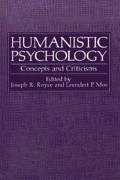Abstract
The inadequacy of a mechanistic psychology such as dominates the academic scene today has long been recognized. Not by polemics, however, can relief be expected; nor will a loosely conceived humanistic psychology provide the remedy. New ideas are required which will neither abandon reason in favor of undisciplined emotion nor drive a wedge between science and life. The general direction of the effort we should be making is clear: the mathematical mode of thought, a signal feature of modern science, must be liberated from its enslavement to mechanistic principles and technological ends, and the general matrix of experience in which it is embedded must be recovered, valued, explored. I will argue that the human mind is at least dual in its tendencies, and that grave perplexities of method issue from this fact, and even more from the neglect of it.
Access this chapter
Tax calculation will be finalised at checkout
Purchases are for personal use only
Preview
Unable to display preview. Download preview PDF.
References
Bachelard, G. The poetics of space. Boston: Beacon Press, 1964.
Clagett, M. Nicole Oresme and the medieval geometry of qualities and motions. Madison: University of Wisconsin Press, 1968.
Crombie, A. C. Medieval and early modern science. Cambridge, Mass.: Harvard University Press, 1967.
Hall, C. S., & Lind, R. E. Dreams, life and literature: A study of Franz Kafka. Chapel Hill: University of North Carolina Press, 1970.
Hulme, T. E., Speculations. New York: Harcourt Brace, 1924.
Hume, D. An inquiry concerning the principles of morals (C. W. Hendel, Ed.). Indianapolis: Bobbs-Merrill, 1957. (Originally published 1751.).
Jones, D. The anathémata. New York: Viking, 1965.
McCurdy, H. G. The personality of Shakespeare: A venture in psychological method. New Haven: Yale University Press, 1953. (Reprinted by Kennikat Press, 1973).
McCurdy, H. G. Personality and science: A search for self-awareness. New York: Van Nostrand, 1965.
Snow, C. P. Variety of men. London: Macmillan, 1967.
Thompson, R. D’Arcy Wentworth Thompson, the scholar-naturalist, 1860-1948. London: Oxford University Press, 1958.
Wordsworth, W. The prelude (E. de Selincourt, Ed.; 2nd ed. rev. by H. Darbishire). Oxford: Clarendon Press, 1959.
Author information
Authors and Affiliations
Editor information
Editors and Affiliations
Rights and permissions
Copyright information
© 1981 Plenum Press, New York
About this chapter
Cite this chapter
McCurdy, H.G. (1981). The Duality of Experience and the Perplexities of Method. In: Royce, J.R., Mos, L.P. (eds) Humanistic Psychology. PATH in Psychology. Springer, Boston, MA. https://doi.org/10.1007/978-1-4684-1071-6_7
Download citation
DOI: https://doi.org/10.1007/978-1-4684-1071-6_7
Publisher Name: Springer, Boston, MA
Print ISBN: 978-1-4684-1073-0
Online ISBN: 978-1-4684-1071-6
eBook Packages: Springer Book Archive

